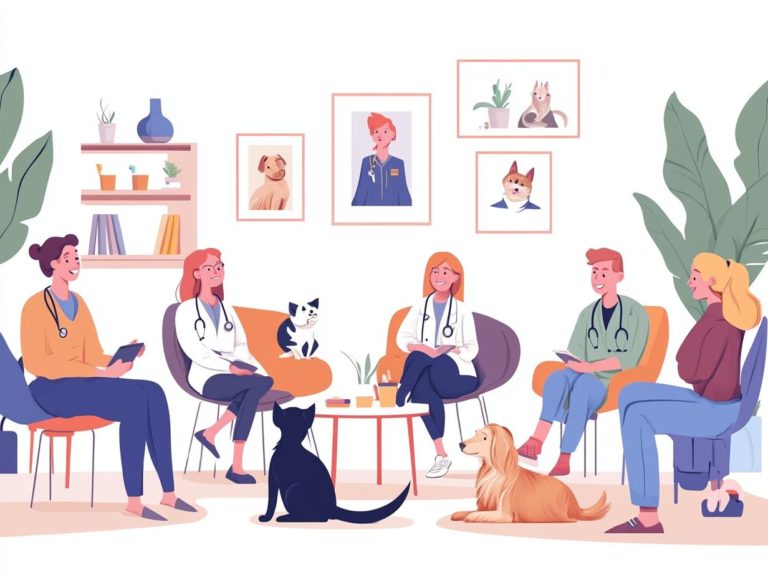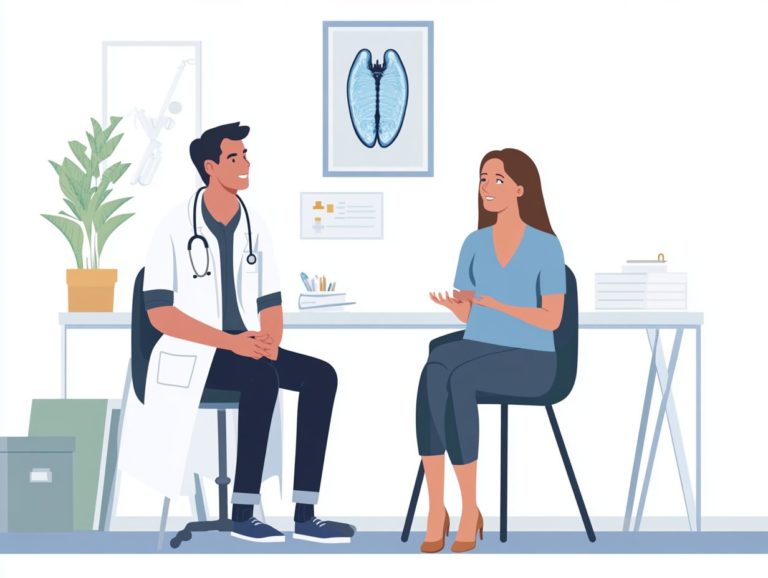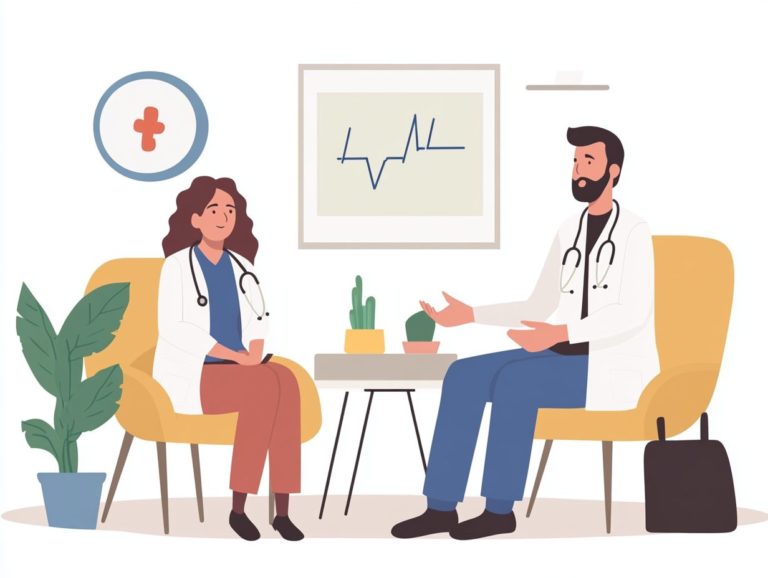Consultations for Rescue Pets: What to Consider
Rescue pets bring immense joy and companionship. However, they often come with their own set of unique challenges. A Rescue Pet Consultation is essential for those interested in rescuing a dog. A consultation can offer tailored advice designed to enhance their well-being and help you navigate these hurdles. This guidance enables you to make informed choices about adopting a pet.
This article delves into the myriad benefits of such consultations. It covers everything from elevating your pet’s quality of life to addressing specific behavioral concerns. It also examines essential factors to consider before scheduling a session and offers tips on how to prepare for a successful consultation.
Explore this guide to uncover ways to provide your rescue pet with the best support possible!
Contents
Key Takeaways:
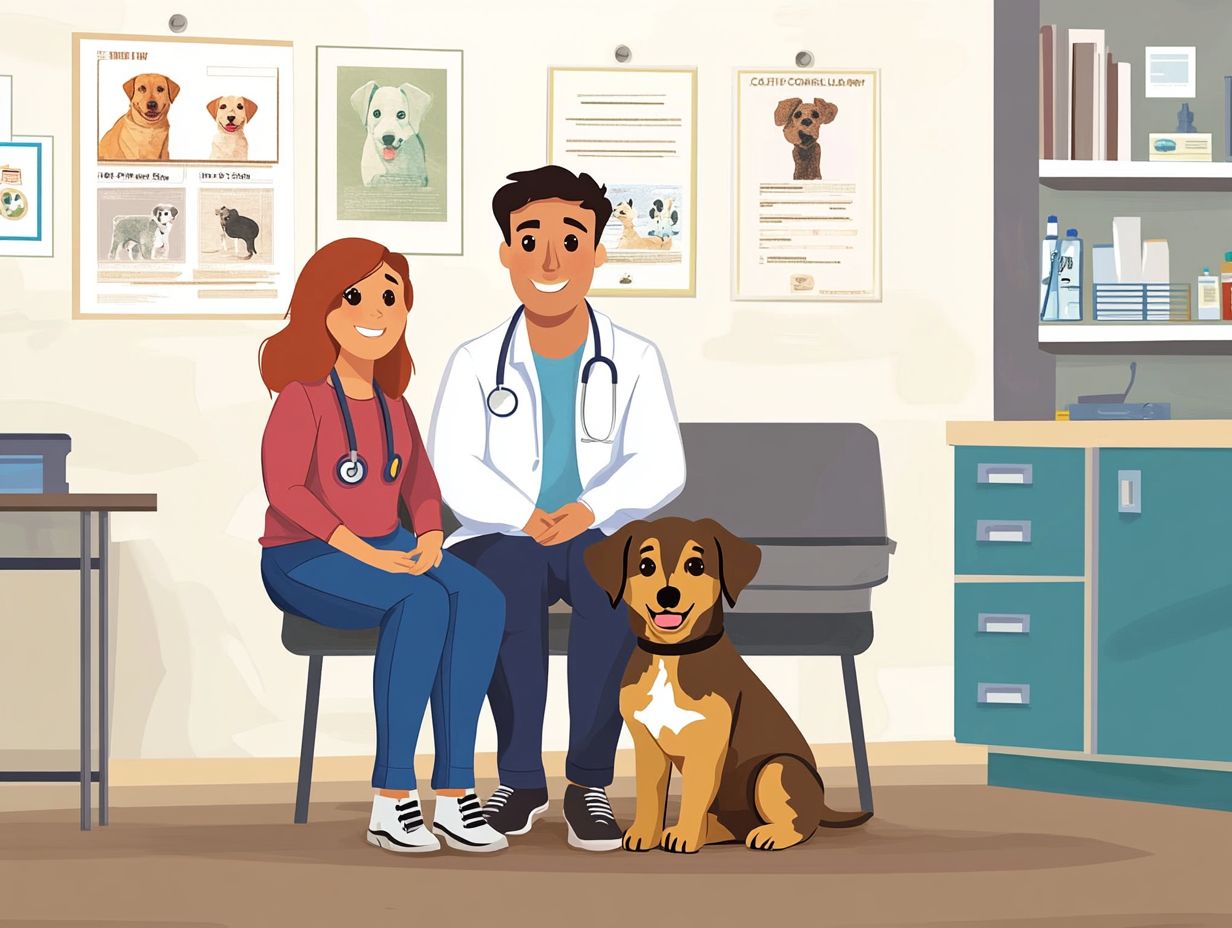
- Think about your rescue pet’s unique background before booking a consultation. Every pet is different and may require specific approaches to improve their quality of life.
- Prioritize gathering necessary information and creating a comfortable environment before a rescue pet consultation. This ensures a successful and productive session for both you and your pet.
- Be aware of the costs and availability of consultations for rescue pets. These services can vary, so it’s important to research and budget accordingly to find the best fit for you and your pet.
What is a Rescue Pet Consultation?
A Rescue Pet Consultation is an invaluable service provided by local shelters and private rescue organizations. It enables potential pet adopters, especially those considering adopting from a shelter, to make informed decisions about rescuing a dog. During this consultation, you’ll gain insights into the dog’s personality, any unusual behaviors, training that helps your dog learn commands, and overall health status. It’s essential to know what pet owners should know before consulting. This thorough process ensures that both you and the furry friend find a perfect match for a forever home, ultimately enhancing the likelihood of a successful adoption.
These consultations provide a crucial opportunity for you to meet with veterinarians and behaviorists. They can delve into the animal s medical history and behavioral tendencies. Be prepared to discuss any past trauma the dog may have experienced. Understanding these elements can significantly impact future behavior and compatibility with your family. The expert guidance you receive in this session helps identify potential challenges and equips you with vital tools and resources to navigate them. This includes insights into the dog s health status and any specific conditions.
This collaborative approach deepens your understanding of the dog’s needs and ensures a smoother transition into their new home.
Benefits of Consultations for Rescue Pets
Consultations for rescue pets offer a wealth of advantages for both the dog’s personality and overall health status. These greatly enhance the likelihood of successful adoptions. By ensuring that you are well-informed about the dog you wish to adopt, these consultations enable you to make thoughtful decisions. Additionally, learning how to handle consultation anxiety in pets fosters a stronger bond between you and your new companion.
Improving Quality of Life
Improving the quality of life for rescue pets is at the heart of consultations. These sessions allow you to uncover the specific needs of each dog, enabling you to provide tailored training and care.
By concentrating on targeted obedience training, you not only deepen your bond with your new companion but also enhance the dog s social skills. This makes them more well-adjusted in a home environment. For example, understanding a rescue dog’s background can illuminate past traumas or behaviors that may require gentle reinforcement.
Community outreach initiatives, such as adoption fairs and educational workshops, further support this mission. They raise awareness and promote responsible pet ownership.
These initiatives enable you, as a potential adopter, to appreciate the significance of patience and understanding. This is crucial when integrating a rescue dog into your family, ultimately leading to a harmonious and fulfilling relationship.
Ready to make a difference for your rescue pet? Let s get started!
Addressing Behavioral Issues
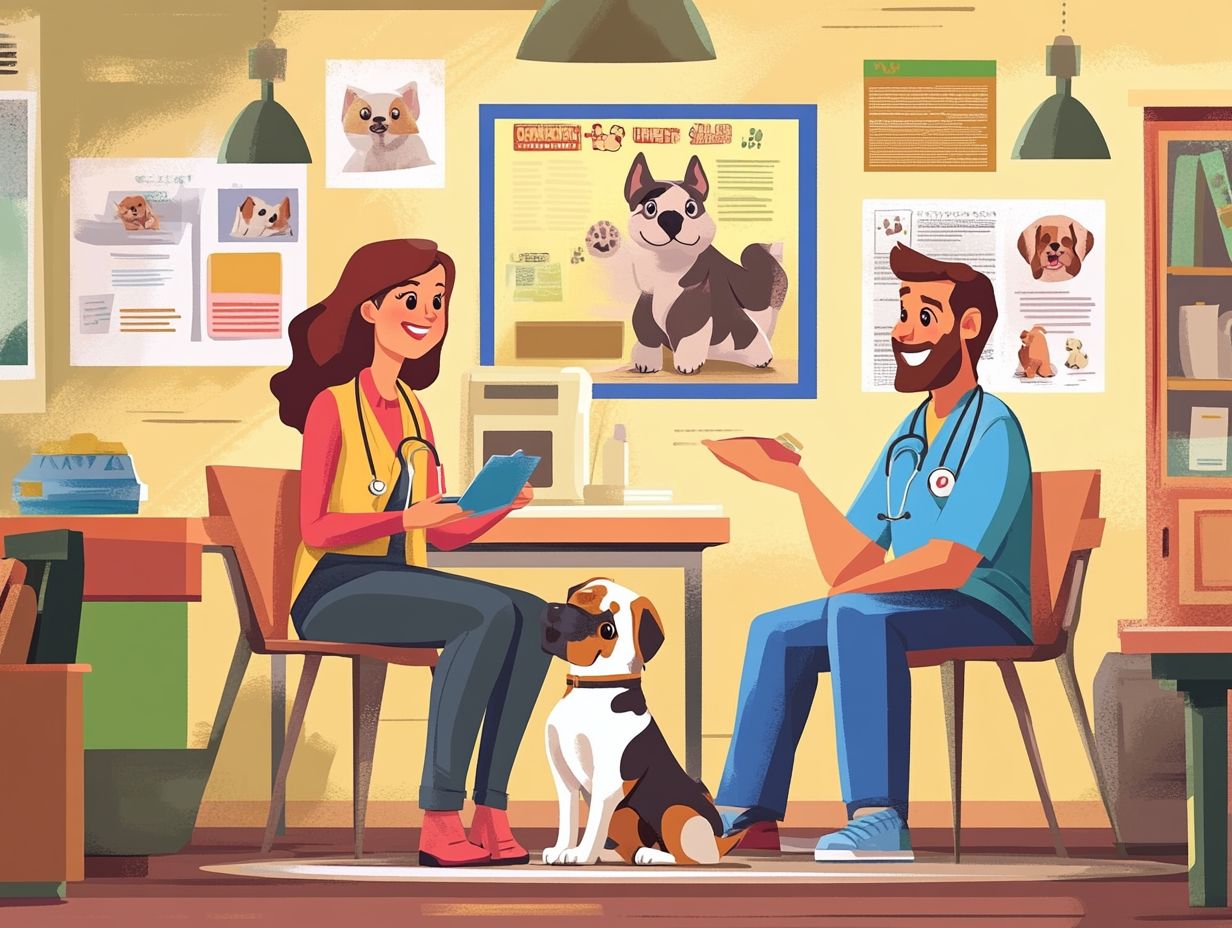
Addressing behavioral issues is a vital part of the rescue pet consultation process, as many dogs come with past traumas that can influence their behavior in your home. These experiences can show up in various ways think anxiety, aggression, or challenges with socialization.
It s crucial for you, as a prospective pet owner, to understand that recognizing these behaviors isn t just about fixing them; it s about fostering a nurturing environment that encourages healing and good manners. A skilled behaviorist offers invaluable insights during consultations, helping you uncover the root causes of these issues and suggesting personalized strategies to address them effectively.
By grasping these behavioral nuances, you’ll be better equipped to ensure a smooth transition for your new furry friend into their forever home, paving the way for a more harmonious relationship between the pet and your family.
Things to Consider Before Scheduling a Consultation
Before you schedule a consultation for adopting a pet, take a moment to reflect on several key factors that could influence both the adoption process and the compatibility of the pet with your lifestyle.
Pet’s Background and Needs
Understanding a pet’s background and needs is essential for you as a prospective adopter. It offers valuable insights into their health status, behavior traits, and any known health conditions.
A thorough examination of a dog’s history, including previous rescues or specific living situations, can reveal crucial information about their unique requirements and emotional well-being. If a dog has faced significant trauma, you might encounter anxiety or fear-based behaviors, which will require a gentle, patient approach in a new home.
Conversely, a well-socialized dog might thrive in lively environments, enjoying interactions with both people and other animals. To assess these factors effectively, you can engage with shelter staff, request detailed narratives of the dog s past, or even observe the dog in different settings to gauge their comfort and reactions.
This understanding not only helps you find the perfect match but also elevates the entire adoption experience.
Consultation Costs and Availability
When you’re thinking about a consultation, it s essential to weigh the costs and explore the services provided by local shelters or private rescue organizations. These organizations may require a monetary donation to support their efforts.
Typically, you might encounter an initial fee for consultations, which can vary depending on the organization’s policies or the specific services you need, such as Fast CAT or Agility training ranging from straightforward advice to specialized assistance.
Many shelters welcome monetary donations to support their operations, though these contributions are not mandatory. To access these invaluable services, you can visit the organization s website or give them a call for more information.
You’ll often find scheduling flexibility, especially if you need an appointment outside of standard hours. If the consultation you desire isn’t available at the moment, don t hesitate to inquire about waiting lists or alternative services that could meet your needs.
Preparing for a Rescue Pet Consultation
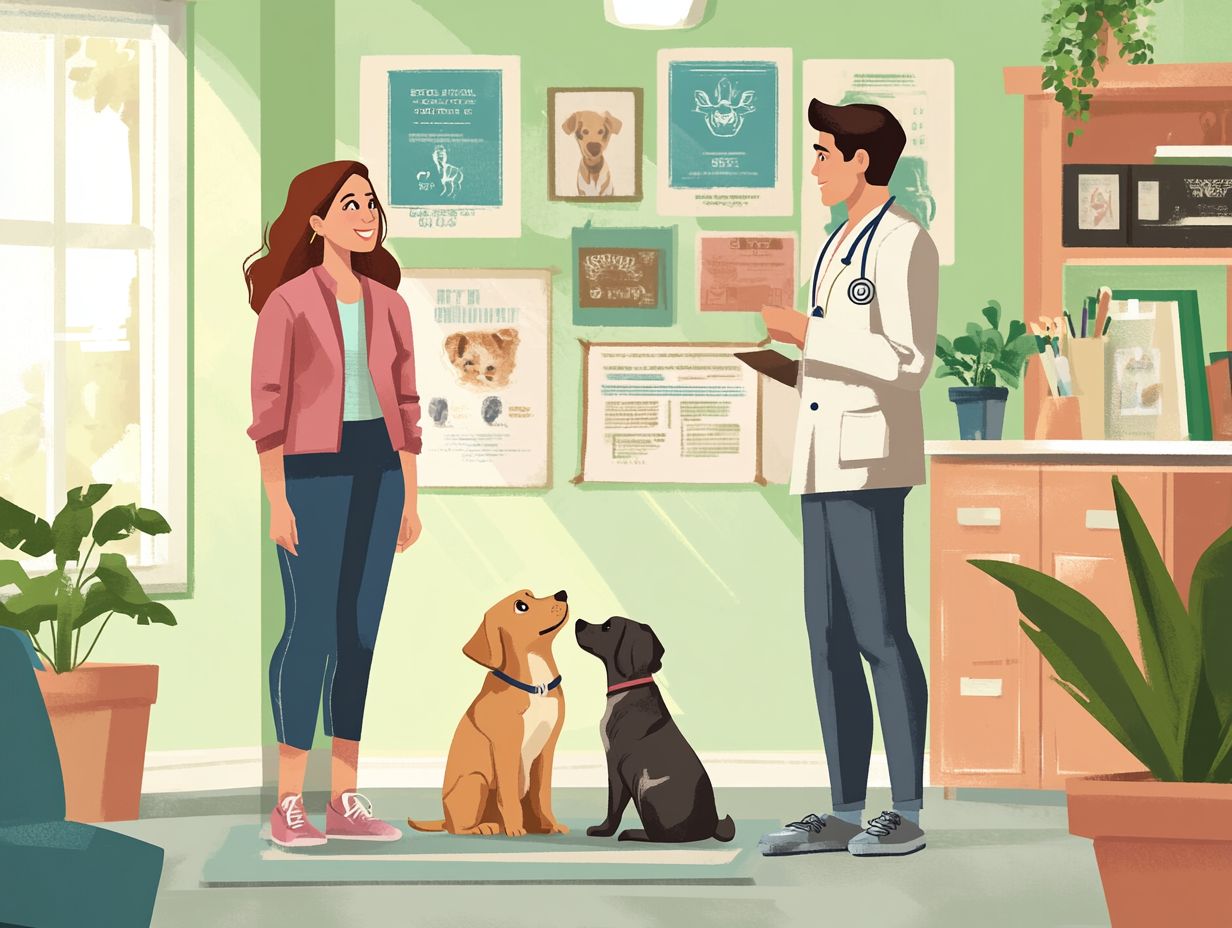
Getting ready for your rescue pet consultation is crucial. This meeting will help you find your new best friend, so let s make it count!
By preparing well, you can ensure that your meeting is not only productive but also enabling, allowing you to make a well-informed decision about adopting a beloved companion.
Gathering Necessary Information
Gathering the necessary information before your consultation can significantly enhance your experience and help you grasp the specifics related to the dog you wish to adopt.
This involves compiling key details, such as how the dog behaves around people and other pets, as well as how well the dog has been trained that reflect the animal s learning history. Understanding the dog’s health status including any health conditions is essential for identifying any special needs or ongoing treatments.
By investing time to explore the dog s personality traits and temperament, you can ensure a much better match, fostering a harmonious relationship that benefits both you and your new canine companion.
Creating a Comfortable Environment
Creating a comfortable environment is vital for helping your newly adopted rescue pet adapt successfully to their forever home. Make sure to create a warm, welcoming space where your new friend feels right at home! This means not only providing a cozy spot where they can retreat and feel secure but also incorporating familiar comfort items like a soft bed, beloved toys, and warm blankets.
It s essential to ensure this space is free from dangers, such as choking risks or toxic plants, to keep your new companion safe. Gradually introducing them to different areas of your home while using positive reinforcement can significantly enhance their sense of security.
Keep in mind that patience is your best ally. Understanding their unique needs and behaviors during this adjustment period will help nurture a bond built on trust and affection.
Frequently Asked Questions
Consultation Importance
What is a consultation for rescue pets, especially when considering adopting a dog, and why is identifying the right consultations for your pet important?
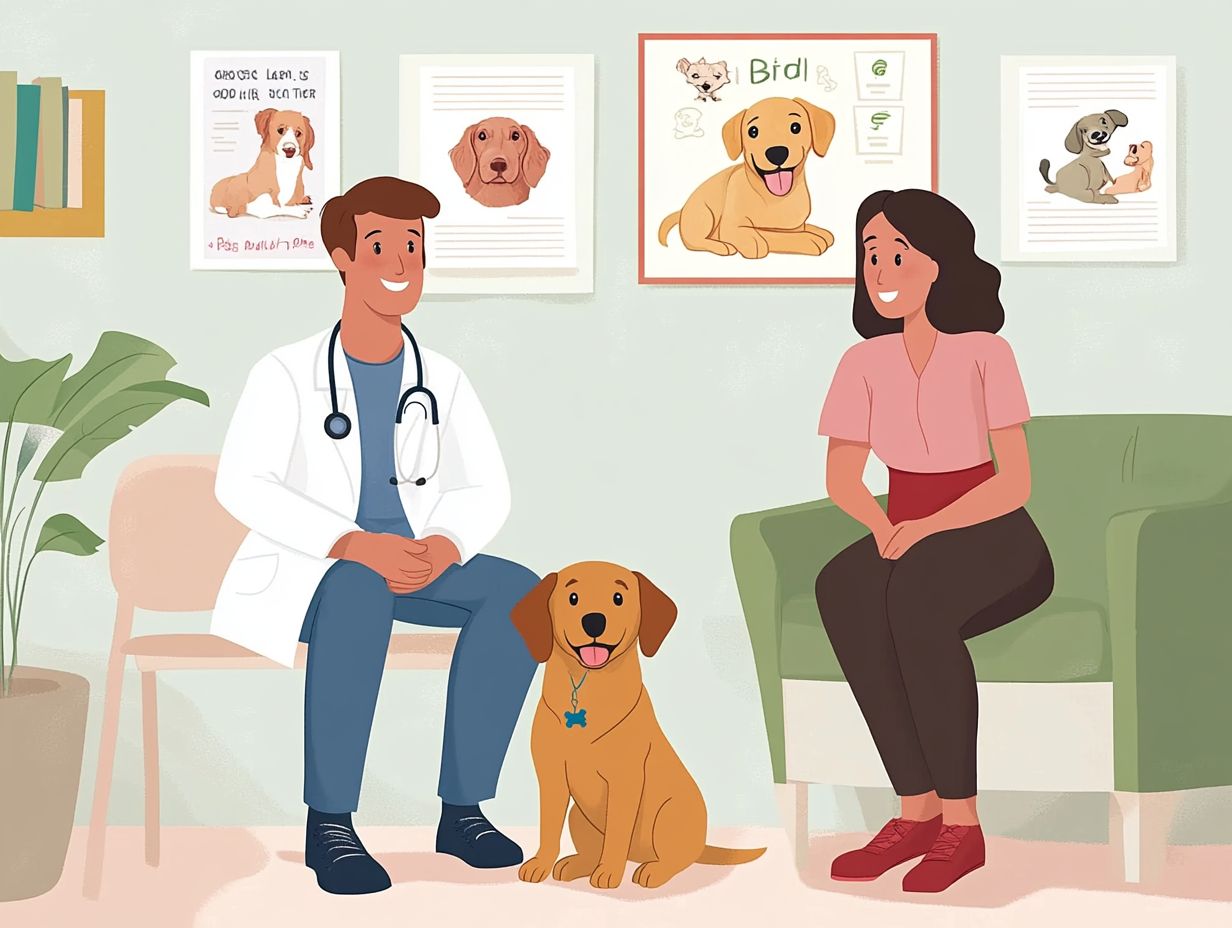
A consultation for rescue pets is a meeting with a rescue organization or shelter to discuss the adoption process and any potential pets. Preparing your pet for a behavior consultation is also important, as it allows you to gather information and make an informed decision about adopting a rescue pet.
Choosing a Shelter
What should I look for when choosing a rescue organization or shelter for a consultation?
When choosing a rescue organization or shelter for a consultation, look for their reputation, adoption process, and the health and behavior of their animals. It is also important to consider their policies and procedures to ensure the safety and well-being of the animals.
Questions to Ask
What questions should I ask during a consultation for rescue pets?
Some important questions to ask during a consultation for rescue pets include the adoption process, the history and background of the pet, any medical or behavioral concerns, and the benefits of holistic consultations for pets, as well as the resources and support available after adoption.
Preparation for Consultation
Should I bring anything to a consultation for rescue pets?
It is helpful to bring a list of questions, your commitment to adopting a rescue pet, and any necessary paperwork such as identification and proof of home ownership or landlord approval. You may also want to bring a family member or friend for support and an extra set of eyes and ears.
After the Consultation
What should I do after a consultation for rescue pets?
After a consultation for rescue pets, take some time to reflect on the information you gathered. If you feel ready to adopt, follow the organization’s adoption process and prepare for bringing your new pet home. If you need more time, do not hesitate to ask for a follow-up consultation or gather more information.
Necessity of Consultation
Is a consultation for rescue pets necessary if I already know I want to adopt a rescue pet?
Yes, a consultation for rescue pets is still important even if you have already made the decision to adopt a rescue pet. It allows you to gather more information about the organization, the specific pet you are interested in, and prepare for a smooth adoption process.
Don’t delay! Schedule your consultation today to find your perfect companion!




